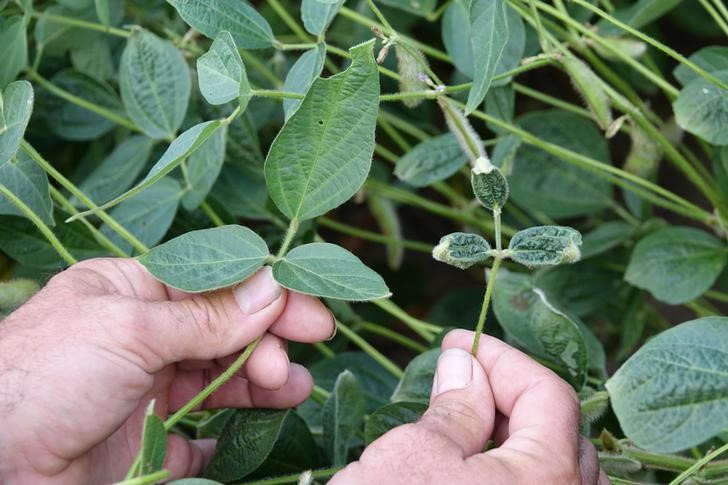By Tom Polansek
CHICAGO (Reuters) - Monsanto Co (N:MON) filed a petition on Thursday asking Arkansas agricultural officials to reject a proposed date next year that would end sprayings of the herbicide dicamba, which has been linked to crop damage across the U.S. farm belt.
A state task force recommended last month that Arkansas bar sprayings after April 15, 2018, to protect plants vulnerable to the chemical, after farmers complained that soybeans and other crops were damaged when the weed killer drifted away from where it was sprayed this summer.
The recommendation amounts to an "unwarranted and misinformed ban on dicamba" because the chemical is designed to be sprayed during the summer over genetically engineered crops, according to Monsanto.
The deadline "is not based on scientific data, much less on any scientific consensus" about crop damage attributed to the chemical, the company said in a filing with the Arkansas State Plant Board.
Monsanto, BASF (DE:BASFn) and DuPont (NYSE:DWDP) sell dicamba herbicides under different brand names to be sprayed on top of growing U.S. soybeans and cotton modified by Monsanto to tolerate the weed killer.
Chemical companies have blamed the damage on farmers misusing dicamba.
Specialists, though, say the weed killers are risky because they have a tendency to vaporize and drift across fields, a process known as volatility. High temperatures can increase volatility.
In July, Arkansas temporarily banned the use and sale of dicamba herbicides after farmers said the chemical was drifting off target.
Monsanto, in its filing, said weed scientists who investigated the reports of damage from dicamba predicted it would probably not cause significant yield losses.
The company also called into question the objectivity of Arkansas weed experts Jason Norsworthy and Ford Baldwin, whom Monsanto said advocated bans on dicamba.
Monsanto said in its petition that Baldwin works as a paid consultant for Bayer Crop Science, which makes glufosinate, a competing herbicide, and that he is serving as a retained expert witness for plaintiffs in a lawsuit against Monsanto involving dicamba.
With its petition, Monsanto submitted an affidavit from Baldwin stating that he works as a consultant for corporate clients including Bayer and endorses a competing weed control technology called glufosinate.
"Baldwin spoke at the first task force meeting in support of a statewide ban on dicamba herbicides in 2018," Monsanto said in its petition.
Baldwin, a private weed consultant and former weed scientist for the University of Arkansas, told Reuters he did not speak in favor of the April 15 ban at the meeting. He declined further comment.
Monsanto also included advertising literature on Bayer's LibertyLink product that quoted Norsworthy saying: "The next best technology is already available in the LibertyLink system."
Norsworthy, a University of Arkansas professor, could not immediately be reached for comment.
Bayer (DE:BAYGn), which is seeking to buy Monsanto for $66 billion, told Reuters that Baldwin and Norsworthy "are two of the preeminent weed scientists in the country."
"Their voices along with other scientists are critical to ensuring sound science that supports the regulatory system," Bayer spokesman Jeff Donald said.
POSSIBLE LAWSUIT
Monsanto's petition also requested the Arkansas plant board change its regulations to allow farmers in the state to use the company's dicamba weed killer, called XtendiMax with VaporGrip, on crops engineered to withstand it "in 2018 and beyond."
Arkansas previously blocked XtendiMax herbicide because the company did not provide testing data that state officials wanted.
The plant board said it had received Monsanto's petition and may consider the company's requests at meetings this month.
Arkansas Gov. Asa Hutchinson has repeatedly encouraged the board to vet the science behind dicamba sprayings when making its decision, said J.R Davis, spokesman for the governor.
"Agriculture is the state's number one industry, and the governor understands the importance of getting this right," he said.
Monsanto may take legal action against the board if it denies the petition, Scott Partridge, the company's vice president of global strategy, told Reuters.
The April 15 deadline "puts Arkansas farmers at an incredible disadvantage," he said.
Monsanto's dicamba-resistant soybeans, called Xtend, will be the company's biggest ever launch of a seed with a biotech trait.
U.S. farmers planted Xtend soybean seeds on about 20 million acres this year, and Monsanto is targeting that by 2019, farmers will plant Xtend soybeans on 55 million acres, or more than 60 percent of the total acreage planted with soybeans this year.

The U.S. Environmental Protection Agency is separately considering banning sprayings of dicamba herbicides after a set deadline next year because of this summer's crop damage, state officials advising the agency told Reuters.